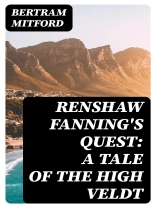In ‘Renshaw Fanning’s Quest: A Tale of the High Veldt, ‘ Bertram Mitford crafts a vibrant tapestry of adventure and exploration set against the backdrop of South Africa’s High Veldt. The novel intertwines elements of adventure fiction with deep-rooted cultural observations of the time. Mitford’s literary style is characterized by rich, evocative imagery and a narrative that seamlessly blends local color with universal themes of identity, belonging, and the human spirit’s resilience. Through Fanning’s journey, the reader is drawn into the complex tapestry of colonial life, offering an insightful look at the social dynamics and challenges of 19th-century Africa. Bertram Mitford, born in 1855, was an English writer and historian whose extensive travels in southern Africa deeply informed his work. His experiences as a resident in this region allowed him to gain a nuanced understanding of its geography and peoples, which is vividly reflected in this novel. Mitford’s firsthand observations enable him to explore the intricacies of the colonial experience, making him a vital voice in the realm of adventure literature during a time of significant global change. ‘Renshaw Fanning’s Quest’ is a must-read for those captivated by colonial narratives and adventure literature alike. It invites readers to embark on a journey filled with discovery and challenge, making it a significant addition to the canon of exploring the human condition amidst the sweeping landscapes of the High Veldt.
About the author
Bertram Mitford (1855–1914) was a late 19th-century and early 20th-century English novelist, whose literary contributions often reflected his adventurous life and keen interest in colonial affairs, especially those of South Africa. In ‘Renshaw Fanning’s Quest: A Tale of the High Veldt, ‘ Mitford explores the drama and allure of the South African landscape, intertwining his narrative with vivid descriptions of the land that often echo his own experiences. Mitford’s literary style combined elements of romantic adventure with ethnographic details, reflecting his interest in Zulu culture and his experiences in colonial administration. His writings often depicted the clash of cultures and the dramatic events of the colonial frontier, and they offered readers escapism combined with a detailed, realistic sense of setting. Mitford’s works are notable for their spirited portrayal of the colonial experience and the natural world of Africa, making him an influential figure in the genre of colonial adventure fiction. However, his literary fame has been somewhat muted over time due to changing tastes and the complex legacy of colonialism that his books inherently represent.












